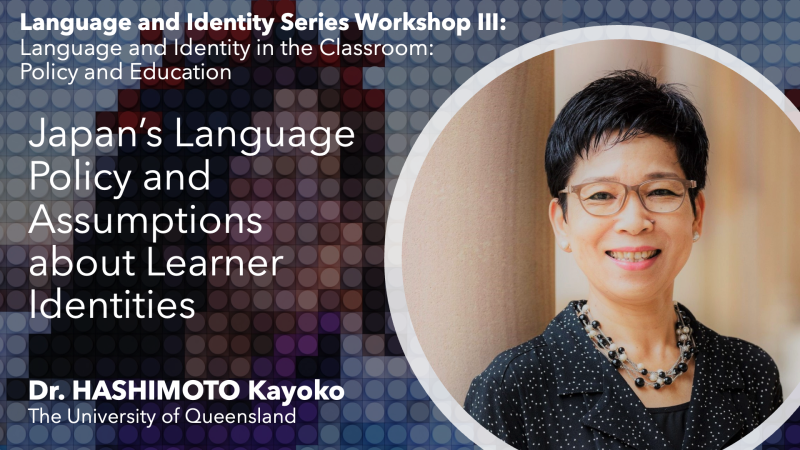Japan’s Language Policy and Assumptions about Learner Identities

Details
| Type | Lecture |
|---|---|
| Intended for | General public / Enrolled students / Applying students / International students / Alumni / Companies / High school students / University students / Academic and Administrative Staff |
| Date(s) | April 17, 2023 13:30 — 14:30 |
| Location | Online |
| Venue | Zoom Webinar |
| Entrance Fee | No charge |
| Registration Method | Advance registration required
https://us02web.zoom.us/webinar/register/WN_MJz6Z_HSTTKhIPK4uvVDgQ#/registration |
| Registration Period | April 13, 2023 — April 17, 2023 |
| Contact | tokyo.college.event@tc.u-tokyo.ac.jp |
Language and Identity Workshop Series 3
Language and Identity in the Classroom: Policy and Education
Keynote Lecture: Japan’s Language Policy and Assumptions about Learner Identities: Promotion of English Language Teaching for Japanese and Japanese Language Teaching for Foreigners
The embedded notion of the inseparable relationship between nation, language, and people has shaped Japan’s language policy. This notion has had a tremendous impact on the way language teaching is planned, promoted, and delivered, and in the era of transnational migration, it is a notion that seems to prevail in Japanese society. The latest revision of the Courses of Study for secondary schools continues to be based on the dichotomy of Japanese versus foreigners in relation to language learning. The instrumental view of English as a tool to promote Japan’s distinctiveness to the rest of the world appears to mirror the way Japanese language teaching has been promoted.
In this talk, I will discuss how learners’ identity has been constructed in so-called “English education” in Japan and how learners’ identity has been assumed in the promotion of Japanese language teaching in Japan and overseas, by analysing relevant policy documents. I will also reflect on how such practices present contradictions and problems for successful policy implementation.
In conclusion, I shall share one of my current projects on Japanese language learners in Australia and Vietnam to illustrate how individual learners with linguistically and culturally diverse backgrounds are empowered by critical engagement in Japanese language learning.
Speaker: Dr. HASHIMOTO Kayoko
Dr Kayoko Hashimoto is Senior Lecturer at School of Languages and Cultures, The University of Queensland, Australia. Her main research area is language policy with particular interest in Japanese and English language teaching in Asia and Australia. Her publications include Asian Studies Review special issue “Japan and Southeast Asia: Language, mobility and employability” (Guest Editor, 2022, Vol. 46, Issue 4), an edited book, Japanese Language and Soft Power in Asia (2018, Palgrave Macmillan), and a co-authored book, Beyond Native-Speakerism: Current Explorations and Future Visions (2018, Routledge, with S. A. Houghton & D. J. Rivers).
Language and Identity in the Classroom: Policy and Education
Keynote Lecture: Japan’s Language Policy and Assumptions about Learner Identities: Promotion of English Language Teaching for Japanese and Japanese Language Teaching for Foreigners
The embedded notion of the inseparable relationship between nation, language, and people has shaped Japan’s language policy. This notion has had a tremendous impact on the way language teaching is planned, promoted, and delivered, and in the era of transnational migration, it is a notion that seems to prevail in Japanese society. The latest revision of the Courses of Study for secondary schools continues to be based on the dichotomy of Japanese versus foreigners in relation to language learning. The instrumental view of English as a tool to promote Japan’s distinctiveness to the rest of the world appears to mirror the way Japanese language teaching has been promoted.
In this talk, I will discuss how learners’ identity has been constructed in so-called “English education” in Japan and how learners’ identity has been assumed in the promotion of Japanese language teaching in Japan and overseas, by analysing relevant policy documents. I will also reflect on how such practices present contradictions and problems for successful policy implementation.
In conclusion, I shall share one of my current projects on Japanese language learners in Australia and Vietnam to illustrate how individual learners with linguistically and culturally diverse backgrounds are empowered by critical engagement in Japanese language learning.
Speaker: Dr. HASHIMOTO Kayoko
Dr Kayoko Hashimoto is Senior Lecturer at School of Languages and Cultures, The University of Queensland, Australia. Her main research area is language policy with particular interest in Japanese and English language teaching in Asia and Australia. Her publications include Asian Studies Review special issue “Japan and Southeast Asia: Language, mobility and employability” (Guest Editor, 2022, Vol. 46, Issue 4), an edited book, Japanese Language and Soft Power in Asia (2018, Palgrave Macmillan), and a co-authored book, Beyond Native-Speakerism: Current Explorations and Future Visions (2018, Routledge, with S. A. Houghton & D. J. Rivers).






